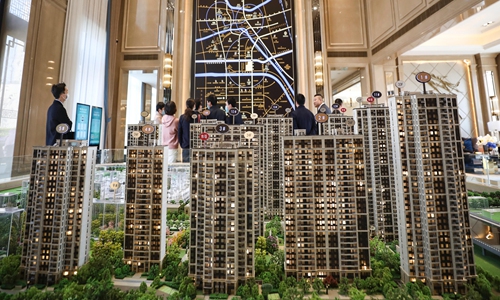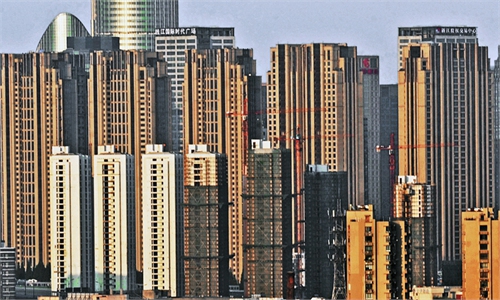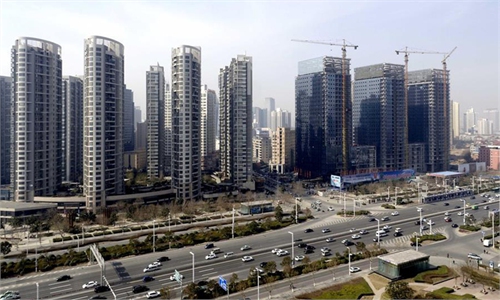Chinese property developers’ sales almost halved in H1, green shoots appear in June

Residents select houses at a sales center of a real estate company in Huaian, East China's Jiangsu Province on Sunday. As China's domestic coronavirus control has made progress, local real estate companies have opened while observing strict measures against the virus. Photo: cnsphotos
Chinese top real estate companies saw their sales almost halved in the first half of 2022 mainly due to constrained consumption amid sporadic COVID-19 flare-ups and the lingering effect of last round of adjustment on the once red-hot market, but analysts have suggested that the sector may be on brink of a turnaround in the second half of the year amid widespread regulatory easing.
Poly Development and Holding Group Co said on Thursday that the company's sales volume stood at 210.22 billion yuan ($31.34 billion) between January and June, registering a decline of 26.29 percent on a yearly basis.
China Vanke Co saw its sales plunge 39.3 percent year-on-year to 215.3 billion yuan, data released by the company showed on Wednesday.
"Between January and June, top 20 property developers in China reported total sales volume of 2 trillion yuan, which is significantly lower than the amount of 3.8 trillion yuan during the same period last year, or 48 percent," Yan Yuejin, research director at Shanghai-based E-house China R&D Institute, told the Global Times on Thursday.
Song Ding, a research fellow at the Shenzhen-based China Development Institute, told the Global Times that the sales performance for these companies remained within expectations, as certain large financially-stressed property developers' actions of leaving their projects incomplete deter buyers, while some hold concerns that home prices may further drop.
Dragged down by weak demand and financial strain facing developers, China's investment in real estate development slid 4 percent to 5.2 trillion yuan in the first five months of 2022, according to data from the National Bureau of Statistics.
In order to boost the recovery of the domestic housing market, more than 180 provinces and cities across the country loosened real estate market restrictions during the first half of the year, with measures including cutting down payment ratios, granting subsidies and ramping up efforts to attract talent, according to a report recently released by the China Index Academy.
Culminating a flurry of housing market-reviving moves, the Chinese central bank lower interest rate floors on mortgages for first-time homebuyers by 20 basis points off the benchmark loan prime rate in mid-May.
Yu Liang, chairman of Chinese developer China Vanke, said at the company's general meeting on June 28 that China's property market has bottomed in the short term, but time still needed for gradual recovery, according to a transcript on the company's WeChat account.
Buoyed by a series of supportive policies to stabilize the real estate market, positive changes have taken place in June. Poly Development and Holding Group saw its sales grow 1.42 percent year-on-year to 51 billion yuan in June, while Vanke's sales surged 53.45 month-on-month in June to 47.19 billion yuan.
Shares of property developers staged a rally on Thursday, with the sector rising 0.61 percent on average and up to 64 stocks rose. Guangzhou Yuetai Group Co trading in Shanghai rose by daily cap of 10 percent to 1.65 yuan, Shenzhen Centralcon Investment Holding Co up 9.67 percent to 9.41 yuan and Shanghai Zhangjiang Hi-Tech Park Development Co up 5.71 percent to 12.58 yuan.
"Although the market has slightly recovered in June, it's far from being a robust rebound," Yan said, noting that the authorities should closely track the market situation, accelerate the release of measures and lift restrictive policies.
He predicted that domestic developers will continue to post sales growth in the second half of the year, with some cities and enterprises expected to see their year-on-year sales volume expand in September.
Song said that local governments are expected to ratchet up support if required, with policies related to urban management and the rental market to be an important emphasis.


